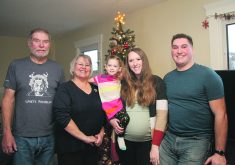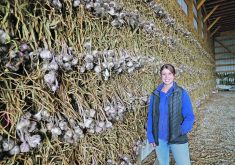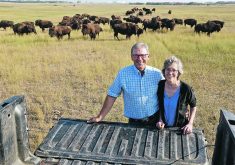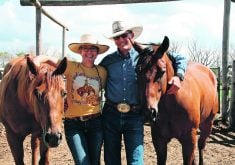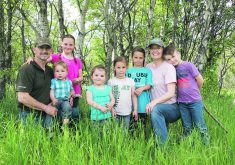The Davis family juggled their agricultural life by pursuing multiple careers in Alberta and Saskatchewan
WISETON, Sask. — Ed Davis was only seven years old when his father, Cal, cut the first furrow in the field and had him smell the dirt.
“That was like the seed of farming put into me,” he said.
“I’ll never forget. Every year, I think of that.”
This month, Davis will seed 1,120 acres of yellow peas, lentils and durum wheat on his family farm near Wiseton. The site is dubbed “grand view farm” for views stretching as far as 80 kilometres on a clear day.
Read Also

Rural Manitoba resources slim on natural disaster planning
A study from Brandon University’s Rural Development Institute has found that many rural and small municipalities don’t have the staff or resources to make formal climate plans against natural disaster.
His wife, Rietta Frick-Davis, is a home economics teacher in Rosetown, Sask., where the family home is located and where the couple is active in the community and church. Davis also works full time as a buyer for Copeland Seeds.
Making multiple careers work is nothing new for the pair, who once commuted to farm from Calgary, but the lifestyle comes with challenges.
For example, $20,000 worth of canola and lentils was once stolen from his farmyard, and his insurer refused the claim because he could not prove the theft. He has since installed cameras.
The family didn’t leave Alberta all at once. Frick-Davis initially remained in Alberta to teach and care for their daughter, Kailyn, now a university student, while Davis commuted to the farm with his infant son.
“I was Mr. Dad for two years,” he said.
His mother, Rose, helped with child care for Logan, now a teenager. She returns to live on the farm each growing season and spends her winters in town with her daughter.
Rose, 83, who has been partially deaf most of her life, kept the farm operating after Cal’s death in 1982.
“My husband told me to stay because it’s your farm,” said Rose, who often put the crop in herself when Cal was ill.
She helped keep the children and farm work separate to avoid accidents, something of paramount importance to Davis.
Frick-Davis said family had to make changes when Kailyn reached school age. She found the teaching job in Rosetown and the family all moved back.
“We had to make some family choices,” she said.
“You just find a balance and make things work and know it won’t be forever.”
The couple sets aside family time each summer, which continues with a father-son getaway each November.
While in Alberta, Davis worked at major ski resorts making snow, grooming runs and later supervising work crews. Back in Saskatchewan, he volunteered at the now closed Twin Towers ski hill.
He recently ran for the Saskatchewan Pulse Growers board on a platform of fiscal responsibility.
“I tried to ensure the money I and farmers were giving to them was going in the right direction,” he said, noting research funding could be reduced and marketing efforts enhanced.
“If Saskatchewan gets a good year, farmers will overproduce. If we could get 10 percent of the North Americans to eat them, that will help what we overproduce.”
Davis was skeptical at first about the money committed for the 2016 International Year of the Pulse campaign but now concedes it has positively increased exposure for the major Saskatchewan crop.
Frick-Davis uses pulses from her farm in classroom lessons and makes her grades 7 to 12 students aware of what’s produced locally.
She called pulses a good protein and fibre source and a good choice for the increasing interest in vegetarian diets among young people.
“If we can grow them, we should be more aware of how to use them,” she said, suggesting promotions in grocery stores and schools.
Frick-Davis, who grew up on a Saskatchewan farm, supports keeping the farm for their children.
“It’s Ed’s first love. It’s always nice to have that base if they choose it,” she said.
Davis said last year was a poor crop year, but prices were good for lentils. This season, he hopes to keep weeds such as narrow-leaved hawk’s beard and Canada thistle at bay with the addition of a high clearance sprayer.
He likes to wait as long as possible for good moisture before seeding so had planned to start the first week in May.
He markets his pulses through his employer and other crops through Viterra and Cargill. His peas go to a splitter or the elevator, depending on the price.
Davis values the advice of agrologists.
“I think it’s worth it. They scout my crop once a week and recommend what to do.”
He also learns much from other farmers.
“Never be afraid to ask what the neighbour’s doing if it looks good,” he said.
The Davis farm is more than 100 years old and was first settled by Davis’s grandparents, Eleanor and Fred, who had five children.
After Fred’s death, Eleanor remarried Jay Shaw and added one child, whose family continues to farm nearby.
Contact karen.morrison@producer.com




